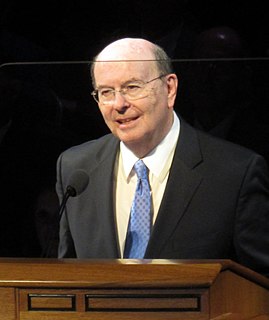A Quote by Dallin H. Oaks
In at least one country where homosexual activists have won major concessions, we have even seen a church pastor threatened with prison for preaching from the pulpit that homosexual behavior is sinful. Given these trends, The Church of Jesus Christ of Latter-day Saints must take a stand on doctrine and principle. This is more than a social issue - ultimately it may be a test of our most basic religious freedoms to teach what we know our Father in Heaven wants us to teach.
Quote Topics
Activists
At Least One
Basic
Behavior
Christ
Church
Concessions
Country
Day
Doctrine
Even
Father
Father In Heaven
Freedoms
Given
Heaven
Homosexual
Issue
Jesus
Jesus Christ
Know
Latter
Least
Major
May
More
Most
Must
One Country
Our
Our Father
Pastor
Preaching
Principle
Prison
Pulpit
Religious
Religious Freedom
Saints
Seen
Sinful
Social
Stand
Take
Teach
Test
Than
Threatened
Trends
Ultimately
Us
Wants
Related Quotes
My church, the Church of Jesus Christ of Latter-Day Saints, puts Jesus Christ at the focal point. It's the focus of everything. What I really hope is that people of faith in this country can come together in this election to ensure we elect a president who's going to do what's required to protect this basic principle of our country.
We declare our belief in Jesus Christ and accept Him as our Savior. He will bless us and guide us in all of our efforts. As we labor here in mortality, He will strengthen us and bring us peace in time of trials. Members of The Church of Jesus Christ of Latter-day Saints walk by faith in Him whose Church it is.
Our entire case as members of The Church of Jesus Christ of Latter-day Saints rests on the validity of this glorious First Vision. ... Nothing on which we base our doctrine, nothing we teach, nothing we live by is of greater importance than this initial declaration. I submit that if Joseph Smith talked with God the Father and His Beloved Son, then all else of which he spoke is true. This is the hinge on which turns the gate that leads to the path of salvation and eternal life.
As Latter-day Saints we must ever be vigilant. The way for each person and each family to guard against the slings and arrows of the Adversary and to prepare for the great day of the Lord is to hold fast to the iron rod, to exercise greater faith, to repent of our sins and shortcomings, and to be anxiously engaged in the work of His kingdom on earth, which is The Church of Jesus Christ of Latter-day Saints. Herein lies the only true happiness for all our Father's children.
One major difference between Mormons and evangelicals on the subject of revelation is that Latter-day Saints believe that God has appointed modern-day prophets and apostles to receive revelation for Christ's church. All church members may receive revelation appropriate for their particular callings or positions within the church and their families, but never in contradiction to church doctrine or policy. So Mormonism has both a democratic practice of revelation that would resonate with evangelicals, but also an institutional understanding of revelation foreign to evangelicalism.
The Church of Jesus Christ of Latter-day Saints proclaims that Jesus Christ is the Son of God in the most literal sense. The body in which He performed His mission in the flesh was sired by that some Holy Being we worship as God, our Eternal Father. Jesus was not the son of Joseph, nor was He begotten by the Holy Ghost.
There are conversations going on about the Church constantly. Those conversations will continue whether or not we choose to participate in them. But we cannot stand on the sidelines while others, including our critics, attempt to define what our Church teaches... We are living in a world saturated with all kinds of voices. Perhaps now, more than ever, we have a major responsibility as Latter-day Saints to define ourselves, instead of letting others define us.
For members of The Church of Jesus Christ of Latter-day Saints, the term 'testimony' is a warm and familiar word in our religious expressions. It is tender and sweet. It has always a certain sacredness about it. When we talk about testimony, we refer to feelings of our heart and mind rather than an accumulation of logical, sterile facts.
A church that suffers no persecution but enjoys the privileges and support of the things of the earth - beware! - is not the true church of Jesus Christ. A preaching that does not point out sin is not the preaching of the gospel. A preaching that makes sinners feel good, so that they are secured in their sinful state, betrays the gospel's call.
In the middle of this despair [of postwar Germany], my family learned about The Church of Jesus Christ of Latter-day Saints and the healing message of the restored gospel of Jesus Christ. This message made all the difference; it lifted us above our daily misery. Life was still thorny and the circumstances still horrible, but the gospel brought light, hope, and joy into our lives. The plain and simple truths of the gospel warmed our hearts and enlightened our minds. They helped us look at ourselves and the world around us with different eyes and from an elevated viewpoint.
Jesus Christ does not teach us a spirituality “of closed eyes”, but one of “alertness”, one which entails an absolute duty to take notice of the needs of others and of situations involving those whom the Gospel tells us are our neighbours. The gaze of Jesus, what “his eyes” teach us, leads to human closeness, solidarity, giving time, sharing our gifts and even our material goods.






























